牛津英语上海版七年级下知识点
牛津沪教版英语七年级下期末重点知识复习总结
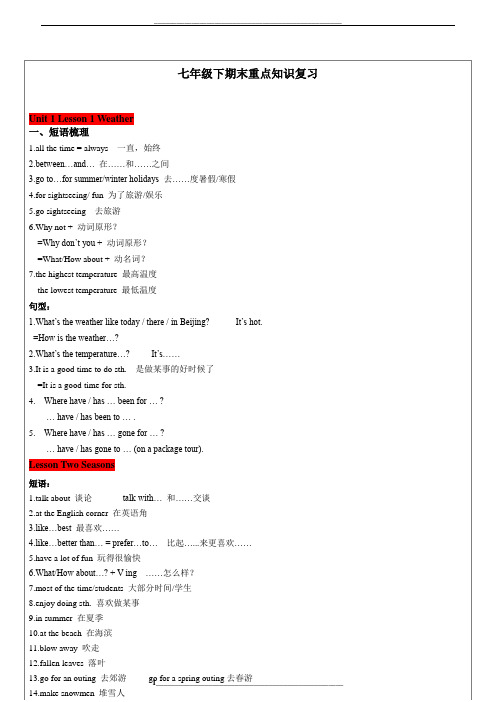
a(one) quarter或one-fourth四分之一three quarters或three-fourths四分之三回答型阅读解题技巧一、专题知识梳理知识点1:回答问题的题型、考点和分值1. 题型:一般疑问句,选择疑问句,反义疑问句,特殊疑问句,主观题2. 考点:对各种疑问句的回答方式及语法的考查(如:时态,主谓一致等)1)一般疑问句的回答:yes or no来回答2)选择疑问句的回答:选择其中的一个或者neither或者both来回答3)反义疑问句的回答:根据事实来回答4)特殊疑问句的回答:why—because/because of, how—by/through doing, how long—for+时间段/since+时间点, when和where提问,介词不能够少,how many或者how far提问时,注意限定词only/more than/ at least/about等5)主观题,注意不能用I think it is interesting或者I think it is good来回答,一定要发表自己的观点和原因。
3. 分值:共12分知识点2:回答问题的技巧1.细节题细节题目比较简单,一般从文中可以直接找到答案,直接抄下来就可以2.归纳总结归纳总结类的题目相对较难,基础好的学生还可以,基础较薄弱的学生一般会抄原文或者自己总结的,但是会出现各种各样的错误二、专题精讲D. Answer the question. (根据短文内容,回答下面问题,12分)It's March, 2050.Frank and Mary Smith wake up in their comfortable house in the morning and switch on the bedroom computer to get the latest news. They used to read the Times, but changed to electronic newspapers many years ago.There is the usual news about space: another space flight has returned from Mars and scientistshave discovered a new planet. Then they turn to business news: the US dollar has risen greatly inShanghai, one of the world's leading business centers. Mary tells the computer to buy 5,000 dollars, andthere is a quick response that it has been done.As they watch the screen, Mary orders one of the household robots to make coffee for them.Frank disappears into the study to join a video conference with his partners aroundthe world. He is a computer engineer, working for several companies. This is histhird job: he used to be in marketing and then television.Mary has a quick look at the shopping channels - the usual selection of electric cars, household robots and cheap travel offers - before picking up the video phone to talk to her assistant. She also hasa job and she is doing medical research. Both she and Frank used to have an office desk in London, butin 2014 they decided to move to the seaside and work from home.Frank and Mary have one daughter, Louise, who also has her own workstation at home. She goes to school only one day a week, mainly to play with other students. Classrooms disappeared in 2030 because there was no longer any need for them: communications systems have made it much easier to learn at home.Louise, now thirteen, is studying Chinese at present, which has become a world language as important as English. Louise has many Chinese friends. They communicate by computer.According to the family doctor, Louise will live to at least 130. Her wish is to work for a few decades (十年) and then spend her time on music and painting.细节题:4.Who proved that Sir Francis Bacon was right?_______________________________________________________.5.What do you think of Sir Francis Bacon?______________________________________________________________.(2)Library Rules for TeenagersWe want you to remember these rules for our city libraries.◆Always remember to take your library card with you when you visit the library. If you don’thave your library card, we won’t let you in.◆Your library card is for your use only. If you lend it to others, you will still be responsiblefor (对……负责任) the books on the card.◆If you lose your library card, you can get a new one for free with your ID card.◆Take good care of what you borrow. If you lose it, you will have to pay for it.◆You can keep the books for up to 31 days. Remember to return the books on time.◆Tell us your e-mail address and we will remind (提醒) you when you need to return the books.◆If what you want to borrow has been borrowed by others, you can send us an e-mail. We will keep the book for youwhen it is returned. When it is your turn, we will tell you.Read and answer the following questions(阅读短文并回答问题):80. Who are these rules for?_______________________________________81. Can we lend our own library card to others for use?_______________________________________82. What can you do if you lose your library card?_______________________________________83. What will happen if you borrow a book from the library and lose it?_______________________________________84. How long can you keep a book?_______________________________________85. Why does the library need readers’ e-mail address?_______________________________________。
上海牛津英语知识点七年级下
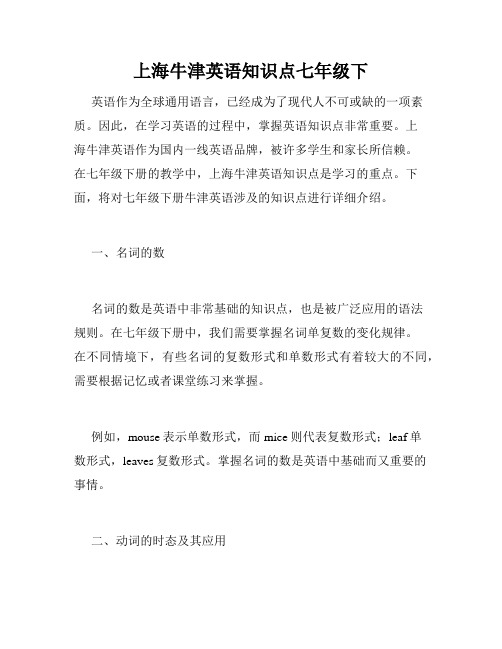
上海牛津英语知识点七年级下英语作为全球通用语言,已经成为了现代人不可或缺的一项素质。
因此,在学习英语的过程中,掌握英语知识点非常重要。
上海牛津英语作为国内一线英语品牌,被许多学生和家长所信赖。
在七年级下册的教学中,上海牛津英语知识点是学习的重点。
下面,将对七年级下册牛津英语涉及的知识点进行详细介绍。
一、名词的数名词的数是英语中非常基础的知识点,也是被广泛应用的语法规则。
在七年级下册中,我们需要掌握名词单复数的变化规律。
在不同情境下,有些名词的复数形式和单数形式有着较大的不同,需要根据记忆或者课堂练习来掌握。
例如,mouse表示单数形式,而mice则代表复数形式;leaf单数形式,leaves复数形式。
掌握名词的数是英语中基础而又重要的事情。
二、动词的时态及其应用在七年级下册中,我们需要能够运用所学的时间形式在句子中正确使用动词的时态。
牛津英语的教学中,对动词时态的掌握是十分重要的,因此从复习一般过去时开始,学习到了现在进行时、将来时等多种时态。
例如,I went to Beijing last year.(我去年去北京了。
)这句话中,went是一般过去时。
而I am playing basketball now.(我现在正在打篮球。
)中,am playing是现在进行时。
正确掌握动词时态,可以让我们的表达更加准确。
三、介词的用法在七年级下议程的英语中,介词也是不可少的语法规则之一。
介词一般出现在名词或代词之前,用来修饰它们,并与句子中的其他成分发挥联络作用。
例如,I went to school by bike.(我骑自行车去学校了。
)中,by是介词。
介词的用法相对复杂,需要从经典实例中学习,记忆是关键。
四、形容词和副词的用法七年级下册的牛津英语中,形容词和副词的用法也占据了语法的一角。
形容词一般用于修饰名词或代词,修饰它们的大小、颜色、形状、性质等。
而副词则用于对动词、形容词等进行修饰和加强。
Unit 2 知识点牛津上海版英语七年级下册

Unit Two 语法小结Name: Class:1. robber [C] n. 强盗[联想] thief (thieves) n. 贼,小偷rob v. 抢劫(robbed, robbed) robbery [C] n. 抢劫案The ________________ happened at 2 a.m. The old man saw two _____________ break into the bank. They _____________ two bags of money.steal v. 偷(stole, stolen)steal sth. from sb. 从某人处偷rob sb. of sth.抢某人某物他偷/抢了我的钱包____________________________________________________________2. hate v. 讨厌,不喜欢hate to do = hate doingdislike v. dislike to do = dislike doing sth.我讨厌和刻薄的人交朋友。
Ihate__________________________________________我讨厌看恐怖电影Idislike_______________________________________________3. adventure [C] 冒险,奇遇All the children listened to his adventures with full attention.adventurer n. 冒险家adventurous a. 冒险的4. in space 在太空in the space 在……的空间里There are many different kinds of stars in_______ space.We can put nothing in_______ space between the two desks.5. full of laughter and fun 充满笑声和欢乐laughter [U] laugh v. ______________ 嘲笑某人be full of = be filled with 充满这部警匪片充满了欢笑(2种)____________________________________.6. miss v. 错过,想念Hurry up, ________________________________ (否则你就要错过早班车了) =If ________________________________________________我很想念母亲_______________________________________7. in a small town far away 在一个遥远的小镇上far away在这里是一个副词短语,置于句末Christmas is a time for friends to send cards to those who live far away.崇明岛离市中心很远_______________________________________8. pay v. (paid, paid)sb. pay money for sth. / sth. cost sb. money / sb. spend money on sth. 付钱用spend, pay, cost填空I have to_________ them 20 pounds for this room each month.They _________ much time writing the report yesterday.This pair of shoes __________ me only 100 yuan.Would you please __________ for my dinner?pay for his carelessness 为他的粗心付出代价pay attention to sb/sth 注意某人/某物pay off 得到回报His hard work paid off.9. altogether adv. 总共,一共altogether = in all=totally车上一共有30人_________________________________________________________ _________________________________10. the way to the cinema 去电影院的路the answer _______ the question the key ______ the door the entrance________ the building11. avenue, street, road, lane, driveavenue通常指两边有树的,通往较大建筑的大街。
上海牛津英语七年级下册U7知识点总结

上海牛津英语七年级下第七单元知识总结授课内容Word forms1. able adj.有能力的,能够的unable adj.不能的,不会的enable vt. 使能够ability n.能力I am afraid I won't be able to visit you on Saturday.A little baby is unable to walk or talk.The new law has enabled more women to return to work.A person of his ability will have no difficulty getting a job.2. hope n../v.希望,期望hopeful adj. hopeless adj.不抱希望的,不给人希望的You're my only hope. Please help me.I hope that you feel better soon.This is a hopeful news.He is hopeless about his chances of winning the contest.3. secret n.秘密secret adj.秘密的;保密的secretly adv.秘密地secretary n.秘书I can’t tell you where we’re going –it’s a secret.He escaped through a secret door.The boy slipped out of the room and headed for the swimming pool secretly.The secretary must take the minutes of the meetings.4.sign v.签(名);签字*signature n.签名;签字I saw him making signs at us.These two signatures are very similar, can you tell them apart?Phrases1.talk about 谈论2.enter a new century 进入一个新世纪3.in the future 在将来4.be able to do sth. 能够做某事5.live on other planets 住在其他的星球上6.enough food for everybody 供给每个人的足够的食物7.grow vegetables 种蔬菜8.in space stations 在宇宙空间站9.people in different countries 不同国家的人们10.speak the same language 说同一种语言11.understand each other better 彼此更加了解12.live in the cities under the sea 住在海底城市13.learn form computers 通过电脑来学习14.take pills for meals 服药片代替吃饭15.travel to other planets in spacecraft 乘宇宙飞船去别的行星旅行16.in people’s homes 在人们的家中17.terrible air pollution 严重的大气污染18.in ten years’ time = in ten years在十年以后19.keep sth. in a secret place 把某物存放在一个秘密的地方20.write down … on … 在……上写下……21.pieces of paper 一张张的纸22.put … in … 把……放在……里23.seal sth. with tape 用胶带密封某物24.pollute the earth 污染地球25.become an astronaut 成为一个宇航员Sentences1. What do you think will happen in the future? 你们认为将来会发生什么?2.Perhaps people will be able to do sth. 可能人们将能够做某事。
上海牛津七年级下册知识点
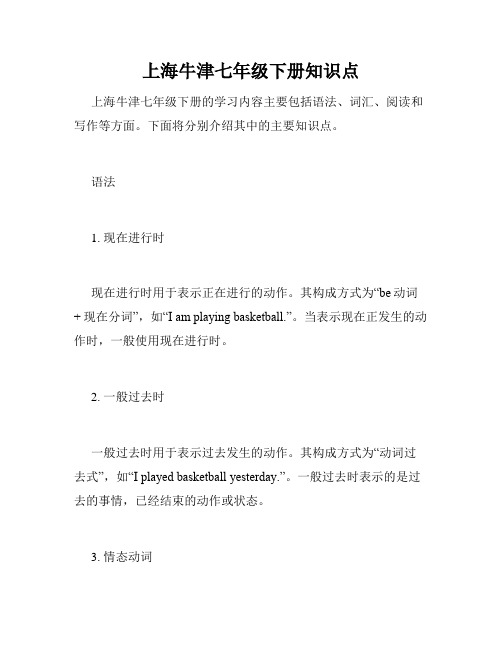
上海牛津七年级下册知识点上海牛津七年级下册的学习内容主要包括语法、词汇、阅读和写作等方面。
下面将分别介绍其中的主要知识点。
语法1. 现在进行时现在进行时用于表示正在进行的动作。
其构成方式为“be动词+ 现在分词”,如“I am playing basketball.”。
当表示现在正发生的动作时,一般使用现在进行时。
2. 一般过去时一般过去时用于表示过去发生的动作。
其构成方式为“动词过去式”,如“I played basketball yesterday.”。
一般过去时表示的是过去的事情,已经结束的动作或状态。
3. 情态动词情态动词用于表示说话者对某种情况或动作的态度。
如“can”表示能力,“may”表示可能,“should”表示应该等。
词汇1. 动物类词汇动物类词汇包括各种动物的名称,如cat、dog、frog等。
在学习动物类词汇时,要注意掌握其正确的用法和发音。
2. 食物类词汇食物类词汇包括各种食物的名称,如rice、noodle、bread等。
在学习食物类词汇时,要注意不同国家或地区的食品名称可能有所不同。
3. 数字类词汇数字类词汇包括数字、时间等,如one、two、three、four等。
掌握数字类词汇对于学习其他知识点也有很大的帮助。
阅读1. 阅读技巧阅读技巧包括猜词、概括、判断等。
学习阅读技巧可以帮助学生更好地理解文章内容,提高阅读效率。
2. 阅读理解阅读理解主要是测试学生对于文章内容的理解和掌握程度。
学生需要通过阅读对文本内容进行分析、推理和判断。
写作1. 作文结构作文结构主要包括开头、中间和结尾三个部分。
开头是引言部分,需要引出文章主题。
中间是论述部分,需要详细阐述主题。
结尾是总结部分,需要回顾文章主题并给出自己的总结和见解。
2. 作文语言作文语言需要遵循一定的规范和语言风格。
好的作文应该有正确的语法、流畅的表达和准确的用词。
总结上海牛津七年级下册的知识点包括语法、词汇、阅读和写作等方面。
牛津上海版七年级英语下册知识点

牛津上海版七年级英语下册知识点The Oxford Shanghai 7th grade English textbook covers a wide range of topics and grammar points to help students improve their English skills. Below are some key knowledge points from the textbook:1. Present Simple TenseThe present simple tense is used to talk about habitual actions, general truths, and routines. It is formed by using the base form of the verb, with 's' added to the verb for third person singular (he, she, it). For example, "He plays football every weekend."2. AdjectivesAdjectives are words that describe nouns. They can be used to provide more information about the noun they are modifying. Adjectives can be used before the noun (e.g. "a tall boy") or after linking verbs such as 'be' (e.g. "The boy is tall").3. Irregular VerbsIrregular verbs do not follow the regular conjugation patterns of adding -ed to form the past tense. Examples of irregular verbs include 'go' (went), 'eat' (ate), and 'see' (saw).4. Past Simple TenseThe past simple tense is used to talk about completed actions in the past. It is formed by adding -ed to regular verbs or using the irregular form for irregular verbs. For example, "We watched a movie last night."5. Comparative and Superlative AdjectivesComparative adjectives are used to compare two things, while superlative adjectives are used to compare three or more things. The comparative form is formed by adding -er to short adjectives (e.g. "taller") and using 'more' with long adjectives (e.g. "more interesting").6. Present Continuous TenseThe present continuous tense is used to talk about actions happening at the moment of speaking. It is formed by using the verb 'to be' followed by the present participle (-ing form) of the main verb. For example, "She is reading a book."7. Prepositions of PlacePrepositions of place are used to indicate the location of something in relation to another object. Common prepositions of place include 'in', 'on', 'at', 'under', 'behind', 'between' etc. For example, "The cat is on the table."8. Modal VerbsModal verbs are auxiliary verbs that express necessity, possibility, permission, or ability. Examples of modal verbs include 'can', 'could', 'will', 'would', 'should', 'must', and 'may'. For example, "You must finish your homework before watching TV."These are just a few of the key knowledge points covered in the Oxford Shanghai 7th grade English textbook. By mastering these points, students can improve their English skills and communicate more effectively in both spoken and written English.。
牛津沪教版英语七年级下重点知识复习
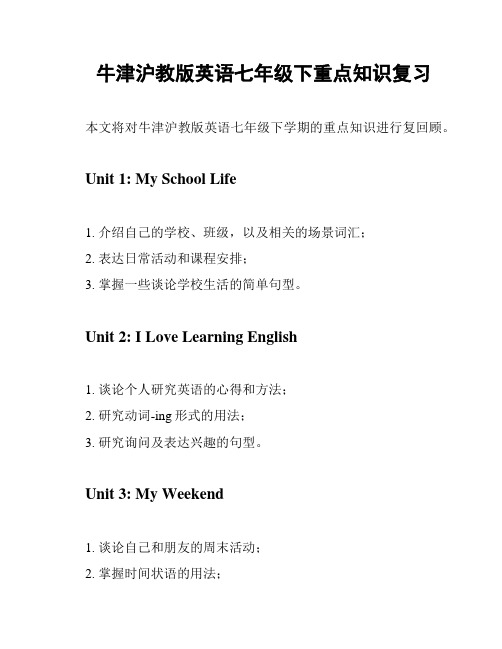
牛津沪教版英语七年级下重点知识复习
本文将对牛津沪教版英语七年级下学期的重点知识进行复回顾。
Unit 1: My School Life
1. 介绍自己的学校、班级,以及相关的场景词汇;
2. 表达日常活动和课程安排;
3. 掌握一些谈论学校生活的简单句型。
Unit 2: I Love Learning English
1. 谈论个人研究英语的心得和方法;
2. 研究动词-ing形式的用法;
3. 研究询问及表达兴趣的句型。
Unit 3: My Weekend
1. 谈论自己和朋友的周末活动;
2. 掌握时间状语的用法;
3. 掌握一些听力技巧。
Unit 4: Jobs
1. 研究表示职业的词汇;
2. 表达及询问个人志愿和理想。
Unit 5: Food and Drink
1. 研究食物和饮品的词汇;
2. 掌握询问及表述食物喜好和不喜好的方法。
Unit 6: Sports and Hobbies
1. 研究表示不同体育项目和爱好的单词;
2. 表达及询问个人感受和喜好。
Unit 7: Travelling
1. 谈论旅游的相关话题;
2. 表达和询问喜欢或不喜欢旅游的理由和偏好。
Unit 8: Festivals and Celebrations
1. 研究表示节日和庆祝活动的单词;
2. 谈论家庭或朋友间的庆祝活动。
总结
以上是牛津沪教版英语七年级下学期的重点知识复习,希望对大家的英语学习有所帮助。
牛津上海版初一七年级下册英语知识点总结
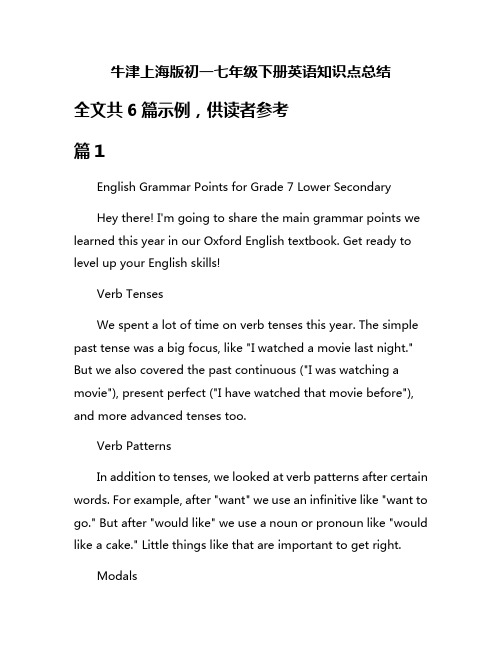
牛津上海版初一七年级下册英语知识点总结全文共6篇示例,供读者参考篇1English Grammar Points for Grade 7 Lower SecondaryHey there! I'm going to share the main grammar points we learned this year in our Oxford English textbook. Get ready to level up your English skills!Verb TensesWe spent a lot of time on verb tenses this year. The simple past tense was a big focus, like "I watched a movie last night." But we also covered the past continuous ("I was watching a movie"), present perfect ("I have watched that movie before"), and more advanced tenses too.Verb PatternsIn addition to tenses, we looked at verb patterns after certain words. For example, after "want" we use an infinitive like "want to go." But after "would like" we use a noun or pronoun like "would like a cake." Little things like that are important to get right.ModalsModal verbs were another grammar area, like "can, could, should, might, may" and so on. We practiced using them to express abilities, permissions, suggestions and more. For example: "You should study hard" or "I might go to the park later."ConditionalsIf clauses and conditional sentences were tricky but useful to express real and unreal situations. Like "If I won the lottery, I would buy a huge house" or "If it rains tomorrow, we will cancel the trip." Keeping the tenses correct was key.Passive VoiceTowards the end of the year, we started learning the passive voice, which switches the object to the subject position. For example: "The ball was kicked by John" instead of "John kicked the ball." Useful for lots of situations!Reported SpeechAnother late grammar topic was reported speech, for quoting what people said. It requires backshifting the tenses and using prompts like "he said..." For example: "He said he was feeling sick."Gerunds and InfinitivesKnowing when to use a gerund ("-ing" verb form acting as a noun) or an infinitive ("to" + verb) was an ongoing challenge. Like "I enjoy reading books" versus "I want to read a book." Tricky stuff!Vocabulary DevelopmentDaily Life & ActivitiesWe learned tons of everyday vocab for things like household items, personal routines, hobbies, school subjects, etc. Useful for discussing our lives!Food & HealthLots of food vocabulary, plus terms for illnesses, injuries, and healthy habits. All helping us describe physical wellness.Travel & TransportationWe built up a nice bank of words for traveling, like types of transportation, destinations, lodging, and cultural activities. For dreaming of adventures!Environment & NatureWith climate change being so important, we studied vocabulary related to the natural world, conservation efforts, pollution, and more.Technology & MediaIn our modern world, we had to cover plenty of tech terms too - from devices and apps to online activities and digital skills.A must these days!Personality & EmotionsDescribing character traits and feelings in English was key too. We got better at understanding and expressing the human experience through new vocab.Overall, this year's textbook really expanded our abilities to communicate effectively in English across many topics and situations. Between the grammar points and vocabulary areas, my English skills have grown a ton! Onward to more learning next year.篇2Title: Top Tips for Acing Grade 7 English Volume 2Hey there, fellow English learners! I'm here to share all the juicy details and top tips I've picked up from studying the Oxford Shanghai Edition Grade 7 Volume 2 English textbook. This book has been a total game-changer for leveling up my English skills,and I'm stoked to break it all down for you in a way that's easy to digest. Get ready to become an English master!Let's start with grammar, shall we? One of the key things we covered was tenses - from the simple present to the past perfect continuous. Keeping track of all those tenses can feel like a mind-bender at times, but once you get the hang of how and when to use them, it's a total breeze. My top tip? Practice, practice, practice with examples from the textbook until it becomes second nature.Next up, we've got modal verbs like "can," "should," and "must." These little guys might seem straightforward, but they can sometimes be tricky to use correctly. Pay close attention to the examples and explanations in the book - that's what really helped cement my understanding.Ah, and let's not forget about those pesky relative clauses! Whether it's defining or non-defining, subject or object, getting these right is crucial for clear, precise communication. The exercises in the book do an awesome job of walking you through different scenarios, so be sure to give them a solid go.Okay, okay, I know grammar can be a bit of a snooze-fest sometimes. But trust me, having a solid grasp of these fundamentals will make everything else we cover so much easierto master. It's like building a strong foundation for an epic English treehouse!Moving on to the fun stuff, we've got reading comprehension and vocabulary galore! The reading passages in this book are top-notch, covering all sorts of fascinating topics from different cultures and perspectives. As you're reading, be sure to jot down any unfamiliar words or phrases and look up their meanings. Building up that vocab bank is key for understanding what you're reading and expressing yourself clearly.And let's not forget about those delicious idioms and proverbs! Sprinkling those into your conversations is a surefire way to sound like a total English pro. The textbook has a ton of great examples and explanations to help you wrap your head around them.Writing is another major focus of this book, and let me tell you, the techniques and strategies they cover are absolute game-changers. From crafting a killer narrative to nailing that persuasive essay, you'll find all the tips and tricks you need to become a writing wizard.One thing that really stood out to me was the emphasis on the writing process - brainstorming, drafting, revising, andediting. It might seem like a lot of steps, but trust me, following this process will take your writing to the next level. Plus, the book provides plenty of examples and guided practice to help you get the hang of it.Okay, let's talk about something that used to make me want to pull my hair out: listening comprehension. Understanding those rapid-fire English conversations and lectures can be a real challenge, but fear not! The listening exercises in this book are designed to gradually build up your skills and confidence.My top tip? Don't get discouraged if you struggle at first. Pause, rewind, and listen again as many times as you need to. Slowly but surely, you'll start picking up on those key words and phrases, and your comprehension will skyrocket.Last but not least, we've got speaking skills. Whether it's engaging in casual conversations or delivering a formal presentation, this book has got you covered with tons of useful expressions, role-plays, and guided practice.One of the most valuable lessons I've learned is the importance of clear pronunciation and intonation. Nailing those can make such a huge difference in how well you're understood and how confident you sound. The pronunciation guides andexercises in the book are absolute lifesavers, so be sure to give them your full attention.Phew, we covered a lot of ground there, didn't we? But don't worry, I'm not done showering you with wisdom just yet. Here are a few final tips and tricks to help you make the most of this incredible textbook:Don't be afraid to make mistakes! Embrace them, learn from them, and keep pushing forward. That's the only way to truly improve.Practice, practice, practice! Whether it's grammar exercises, writing prompts, or speaking drills, the more you actively apply what you're learning, the better it will stick.Have fun with it! Learning English doesn't have to be a chore. Explore the cultural elements woven throughout the book, watch movies or shows in English, and find ways to make the language your own.Stay positive and believe in yourself! Mastering a new language is no easy feat, but you've got this. Celebrate your progress, no matter how small, and keep that motivation fire burning bright.Alright, my fellow English enthusiasts, that's a wrap! I hope this summary has given you a solid overview of what to expect from the Oxford Shanghai Edition Grade 7 Volume 2 English textbook and some killer tips to help you conquer it. Remember, with hard work, determination, and maybe a little bit of quirkiness thrown in, you've got this in the bag!Now go forth, study hard, and unleash your inner English rockstar!篇3Hey there fellow English learners! As we wrap up the 7th grade English textbook, I wanted to share a recap of all the major grammar points and vocabulary we covered this year. Mastering this stuff is gonna be super important as we head into 8th grade next year.First up, let's talk about tenses. We learned all about the different verb tenses this year - simple present, present continuous, simple past, past continuous, present perfect, etc. Being able to use these properly is key for speaking and writing clearly in English. The present tenses are for things happening now, the past tenses for stuff that already happened, and thefuture tenses for events still to come. Don't forget modal verbs too like "can", "should", "might" etc.Then there were all those pesky grammar rules we had to follow. Things like subject-verb agreement (like "he walks" not "he walk"), making nouns plural, using possessive forms ('s), comparatives and superlatives for adjectives...the list goes on! Remembering all the different rules can be a pain, but getting them right really smooths out your English.We also spent a bunch of time on question forms and question words like "what", "where", "why" etc. Asking good questions is an important skill. Oh and I can't forget about negative statements - adding "not" or using contractions like "doesn't" and "can't". Being able to negate things properly is crucial.On the vocabulary side, we learned soooo many new words divided up into different topics and contexts. Animals, occupations, hobbies, school life, describing people and personalities, you name it! Building up that word power makes it much easier to understand what you're reading and to express yourself clearly.We had units on things like daily routines, free time activities, shopping, travel and tourism, traditions and customs around theworld. The dialogues and passages in the textbook really helped bring those vocabulary words to life and put them into realistic contexts.Then there were those slightly more academic topics we covered like environmental protection, social issues, scientific discoveries and technological innovations. Vocabulary related to those more scholarly subjects can be pretty advanced, but getting exposure to it now will pay off later.Phew, I'm getting a little winded just recapping all that we learned! But that's not all - we also worked a ton on our reading comprehension and writing skills over the course of the year. The reading passages always had lots of practice questions to test our understanding. And the writing tasks had us crafting all sorts of different text types like emails, stories, descriptions, persuasive essays and more.Oh and how could I forget about those grammar and vocabulary exercises? Page after page of fill-in-the-blanks, sentence rearranging, matching columns...you name it! Drilling those skills is maybe a little tedious, but that's how you really internalize that knowledge.Okay, I could probably go on, but I'll wrap it up there. Hopefully this refresher on all the key grammar, vocabulary,reading and writing points we covered gives you a nice summary to refer back to. We crammed a ton into this 7th grade book!Just being able to understand and produce all this stuff is already a huge achievement. But of course, the real test is being able to use it all naturally when speaking and listening too. That's a whole other challenge!Anyway, that's my two cents as we put a bow on 7th grade English. Why don't you let me know what you thought were the most important or most difficult parts? I'm sure everyone has different areas they struggled with. We're all in this together as English learners!篇4My English Adventure: Oxford Shanghai Edition - Grade 7 Volume 2Hi there! Are you ready to embark on an exciting English adventure with me? In this article, I'll be sharing some of the key knowledge points from the Oxford Shanghai Edition for Grade 7, Volume 2. Let's dive in!1. Vocabulary VoyageVocabulary is like a treasure trove of words that helps us express ourselves. In this book, we learn new words related to various topics such as family, school, hobbies, and more. It's important to practice these words regularly to become a master communicator!2. Grammar GalaxyGrammar is like the secret code that makes English make sense. In Grade 7, Volume 2, we explore different tenses, sentence structures, and parts of speech. Here are a few important grammar points to remember:Present Simple tense: We use it to talk about habits, routines, and general facts. For example, "I always brush my teeth before bed."Past Simple tense: We use it to talk about actions that happened in the past. For example, "Yesterday, I visited my grandparents."Comparative and Superlative adjectives: We use comparatives to compare two things and superlatives to compare more than two things. For example, "My dog is bigger than yours, but hers is the biggest."Prepositions: These are words like "in," "on," and "at" that show relationships between objects. For example, "The book is on the table."3. Reading RocketReading is like taking a rocket ship to explore new worlds and gain knowledge. Grade 7, Volume 2 introduces interesting stories, articles, and dialogues. Remember to read actively, understand the main idea, and look for important details. It's also helpful to keep a dictionary nearby to look up new words.4. Listening LaunchpadListening is an essential skill for understanding others and improving our own language abilities. The book provides listening exercises that help us recognize different accents, understand conversations, and follow instructions. Practice listening to English songs, watching English shows, and chatting with friends in English to boost your skills!5. Writing WonderlandWriting allows us to express our thoughts and ideas. In Grade 7, Volume 2, we focus on descriptive writing, narrative writing, and writing formal letters. Remember to plan your writing, use appropriate vocabulary and grammar, and proofreadfor mistakes. Let your imagination run wild and create amazing stories!6. Speaking SpaceSpeaking English helps us communicate with people from different cultures and backgrounds. Through dialogues,role-plays, and discussions, Grade 7, Volume 2 encourages us to speak confidently. Don't be shy! Practice speaking English with your classmates, friends, and even your family members.7. Exam ExplorerExams are like little quests that test our knowledge and skills. The book provides practice exercises and tips to prepare for exams. Manage your time wisely, review each unit, and ask your teacher for help if you're unsure about anything. Remember, every challenge is an opportunity to grow!That's it for our English adventure through the Oxford Shanghai Edition for Grade 7, Volume 2. Remember to have fun, stay curious, and never stop learning. English is a magical language that can take us on incredible journeys!Happy learning, and may your English skills soar to new heights!篇5English Summary for Grade 7 (Second Semester)Hey guys! Let me share with you the main things we learned in English class this semester. Our textbook was packed with cool stuff to help us speak better English.First up, we covered a ton of new vocabulary words across different units. From words related to health and fitness like "nutritious" and "stamina", to words about technology like "innovative" and "entrepreneur". Oh, and who could forget all those descriptive adjectives we picked up like "magnificent" and "breathtaking"? Using a wider range of vocabulary really leveled up our English expression.The grammar learning was also super helpful. We studied different tenses like the past perfect for talking about experiences before a certain point in the past. The passive voice was new too - that's for when the object of a sentence becomes the subject, like "The books were returned to the library." Using it made our sentences more formal and objective.Then there were things like conditional sentences with "if" clauses to discuss hypothetical situations. And don't forget the causative "have/get" structure for asking someone to dosomething, like "I had my brother clean the room." Slowly but surely, we're becoming grammar pros!Reading comprehension was a big focus as well. We read all sorts of passages - stories, articles, interviews, you name it. The key was learning strategies to understand the main ideas, make inferences based on details, and identify the author's purpose and tone. Annotating the texts by underlining and taking notes in the margins was really handy.For writing, we covered different text types like narratives, descriptions, expository essays and more. Having a clear structure with an introduction, body paragraphs and conclusion was crucial. We worked on developing our ideas with examples and elaboration. Using transition words and varying our sentences made the writing flow better too.Let's not forget about speaking and listening skills! We did a bunch of engaging activities like role plays, discussions, and audio exercises. Staying focused to catch key details was important for listening texts. For speaking, we focused on things like clarity, intonation, and using discourse markers like "Basically,...", "For instance,...".Project work was a highlight this term too! We got to work collaboratively in teams to create amazing presentations, skits,posters and more. It helped bring together all the different skills we were learning. Those final product showcases were always so awesome.Phew, that was a lot! I've got to give props to our textbook for packing in such a wide range of useful material to take our English abilities to new heights. Even though there was a ton to learn, the way it was taught made it feel easy and even fun at times. Can't wait to see what challenging stuff awaits us next year! For now, it's summer vacay time - yay!篇6Learning English: A Student's JourneyHey there, fellow students! As we embark on our journey through the fascinating world of English, let's take a moment to reflect on the incredible voyage we've embarked upon. The Oxford Shanghai Edition Grade 7 English textbook has been our trusty companion, guiding us through the intricate twists and turns of this beautiful language.First and foremost, let's talk about the building blocks of English: vocabulary. This textbook has introduced us to a wealth of new words, each with its unique meaning and purpose. From everyday expressions to subject-specific terminology, we'velearned how to weave these words together to create meaningful sentences and convey our thoughts effectively.But vocabulary alone is just the tip of the iceberg! We've also delved into the intricate world of grammar, exploring the rules that govern the way words are arranged and used. From tenses and subject-verb agreement to complex sentence structures, we've gained a deeper understanding of how to construct sentences that are not only grammatically correct but also logically coherent.Reading comprehension has been another vital aspect of our English journey. Through engaging texts and thought-provoking passages, we've honed our ability to analyze and interpret written material. We've learned to identify main ideas, make inferences, and draw connections between different pieces of information. This skill is invaluable, not only for academic success but also for navigating the world around us.Speaking and listening have also been at the forefront of our learning experience. We've practiced engaging in conversations, expressing our opinions, and actively listening to others. Through role-plays, discussions, and storytelling activities, we've gained confidence in our ability to communicate effectively inEnglish, a skill that will undoubtedly serve us well in our future endeavors.Writing, the art of expressing our thoughts on paper, has been another critical component of our studies. From crafting well-structured paragraphs to developing cohesive essays, we've explored various writing styles and genres. We've learned the importance of organization, clarity, and effective word choice, equipping us with the tools to convey our ideas in a compelling and persuasive manner.But our journey hasn't been solely focused on mastering the technical aspects of English. We've also explored the rich tapestry of cultures and traditions woven into the language. Through literature, art, and multimedia resources, we've gained insights into the diverse perspectives and experiences that shape the English-speaking world.Moreover, our textbook has emphasized the importance of critical thinking and analytical skills. We've learned to approach tasks and challenges with a discerning eye, questioning assumptions, and considering multiple viewpoints. This mindset will undoubtedly serve us well as we navigate the complexities of life and make informed decisions.As we near the end of our journey with this textbook, let's take a moment to appreciate the progress we've made. Each lesson, each activity, and each challenge has been a stepping stone towards becoming proficient and confident English speakers, writers, and thinkers.However, our journey doesn't end here. The knowledge and skills we've acquired are merely the foundation upon which we'll continue to build. As we move forward, let's embrace the endless opportunities that lie ahead, eager to expand our horizons and explore new frontiers of learning.Remember, the key to success lies in perseverance, curiosity, and a willingness to step outside our comfort zones. Let's continue to embrace challenges, seek out new experiences, and never stop learning. The world of English is vast andever-evolving, and with our newfound skills and knowledge, we are well-equipped to navigate its depths with confidence and grace.So, let's raise a metaphorical glass to our achievements and look forward to the exciting adventures that await us on our ongoing quest for knowledge and personal growth. The journey continues, and together, we'll conquer new heights, one word, one sentence, and one idea at a time.。
(word完整版)牛津沪教版英语七年级下期末重点知识复习总结,推荐文档
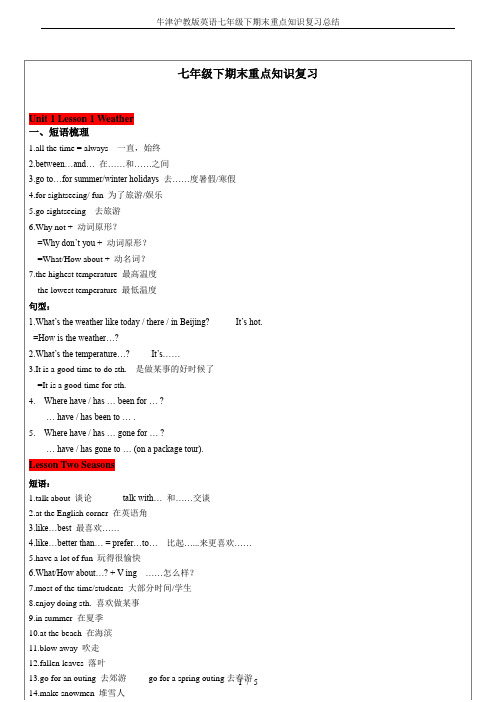
a(one) third 或one-third三分之一three-fifths五分之三a(one) half二分之一a(one) quarter或one-fourth四分之一three quarters或three-fourths四分之三回答型阅读解题技巧一、专题知识梳理知识点1:回答问题的题型、考点和分值1. 题型:一般疑问句,选择疑问句,反义疑问句,特殊疑问句,主观题2. 考点:对各种疑问句的回答方式及语法的考查(如:时态,主谓一致等)1)一般疑问句的回答:yes or no来回答2)选择疑问句的回答:选择其中的一个或者neither或者both来回答3)反义疑问句的回答:根据事实来回答4)特殊疑问句的回答:why—because/because of, how—by/through doing, how long—for+时间段/since+时间点, when和where提问,介词不能够少,how many或者how far提问时,注意限定词only/more than/ at least/about等5)主观题,注意不能用I think it is interesting或者I think it is good来回答,一定要发表自己的观点和原因。
3. 分值:共12分知识点2:回答问题的技巧1.细节题细节题目比较简单,一般从文中可以直接找到答案,直接抄下来就可以2.归纳总结归纳总结类的题目相对较难,基础好的学生还可以,基础较薄弱的学生一般会抄原文或者自己总结的,但是会出现各种各样的错误二、专题精讲D. Answer the question. (根据短文内容,回答下面问题,12分)It's March, 2050.Frank and Mary Smith wake up in their comfortable house in the morning and switch on the bedroom computer to get the latest news. They used to read the Times, but changed to electronic newspapers many years ago.There is the usual news about space: another space flight has returned from Mars and scientistshave discovered a new planet. Then they turn to business news: the US dollar has risen greatly inShanghai, one of the world's leading business centers. Mary tells the computer to buy 5,000 dollars, andthere is a quick response that it has been done.As they watch the screen, Mary orders one of the household robots to make coffee for them.Frank disappears into the study to join a video conference with his partners aroundthe world. He is a computer engineer, working for several companies. This is histhird job: he used to be in marketing and then television.Mary has a quick look at the shopping channels - the usual selection of electric cars, household robots and cheap travel offers - before picking up the video phone to talk to her assistant. She also hasa job and she is doing medical research. Both she and Frank used to have an office desk in London, butin 2014 they decided to move to the seaside and work from home.Frank and Mary have one daughter, Louise, who also has her own workstation at home. She goes to school only one day a week, mainly to play with other students. Classrooms disappeared in 2030 because there was no longer any need for them: communications systems have made it much easier to learn at home.Louise, now thirteen, is studying Chinese at present, which has become a world language as important as English. Louise has many Chinese friends. They communicate by computer.According to the family doctor, Louise will live to at least 130. Her wish is to work for a few decades (十年) and then spend her time on music and painting.3. Many people didn’t believe Sir Francis Bacon, did they?______________________________________________________.4.Who proved that Sir Francis Bacon was right?_______________________________________________________.5.What do you think of Sir Francis Bacon?______________________________________________________________.(2)Library Rules for TeenagersWe want you to remember these rules for our city libraries.◆Always remember to take your library card with you when you visit the library. If you don’thave your library card, we won’t let you in.◆Your library card is for your use only. If you lend it to others, you will still be responsiblefor (对……负责任) the books on the card.◆If you lose your library card, you can get a new one for free with your ID card.◆Take good care of what you borrow. If you lose it, you will have to pay for it.◆You can keep the books for up to 31 days. Remember to return the books on time.◆Tell us your e-mail address and we will remind (提醒) you when you need to return the books.◆If what you want to borrow has been borrowed by others, you can send us an e-mail. We will keep the book for youwhen it is returned. When it is your turn, we will tell you.Read and answer the following questions(阅读短文并回答问题):80. Who are these rules for?_______________________________________81. Can we lend our own library card to others for use?_______________________________________82. What can you do if you lose your library card?_______________________________________83. What will happen if you borrow a book from the library and lose it?_______________________________________84. How long can you keep a book?_______________________________________85. Why does the library need readers’ e-mail address?_______________________________________。
七年级英语下册重点内容(沪教牛津版)
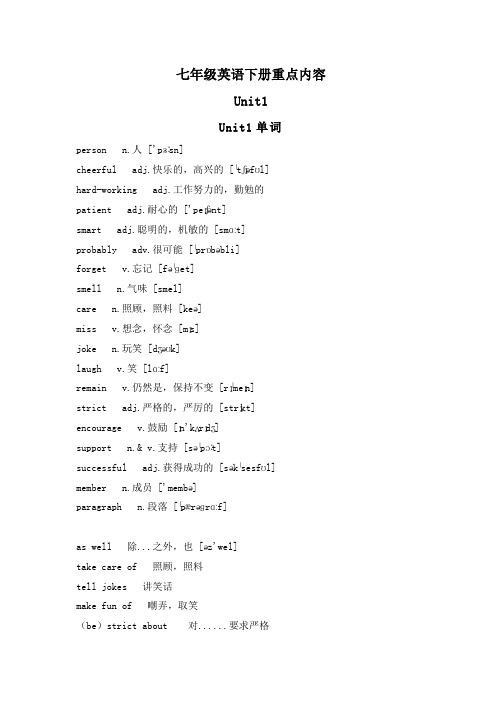
七年级英语下册重点内容Unit1Unit1单词person n.人 ['pɜːsn]cheerful adj.快乐的,高兴的 [ˈtʃɪəfʊl]hard-working adj.工作努力的,勤勉的patient adj.耐心的 ['peɪʃənt]smart adj.聪明的,机敏的 [smɑːt]probably adv.很可能 [ˈprɒbəbli]forget v.忘记 [fəˈɡet]smell n.气味 [smel]care n.照顾,照料 [keə]miss v.想念,怀念 [mɪs]joke n.玩笑 [dʒəʊk]laugh v.笑 [lɑːf]remain v.仍然是,保持不变 [rɪˈmeɪn]strict adj.严格的,严厉的 [strɪkt]encourage v.鼓励 [ɪn'kʌrɪdʒ]support n.& v.支持 [səˈpɔːt]successful adj.获得成功的 [səkˈsesfʊl]member n.成员 ['membə]paragraph n.段落 [ˈpærəɡrɑːf]as well 除...之外,也 [əz'wel]take care of 照顾,照料tell jokes 讲笑话make fun of 嘲弄,取笑(be)strict about 对......要求严格give up 放弃go to work 上班all day and all night 夜以继日Unit1必考短语和句型1. hard-working “勤勉的,努力工作的"作定语work hard动副结构短语2. be patient with sb. “对某人有耐心“3. take (one’s) time to do sth.“花费时间做某事”It takes sb. some time to do sth.=sb. spend some time on sth./(in) doing sth.“做某事需花费……时间”4. like doing sth.“喜欢做某事”(表喜欢、爱好某种经常的或习惯性的活动)like to do sth. “喜欢去做”(表喜欢、爱好某种特定的或具体的活动)Eg. I like visiting friends on Sundays and I like to visit Tom this Sunday.like sb. to do sth.“喜欢某人做某事”Eg. We all like him to play the guitarlike 介词Eg. She looks like her father.5. witha. 同,与,和 talk with a friendb. 用(工具、手段) cut meat with a knifec. 在……身边(随身携带) Do you have any money with you? Take an umbrella with you?d. 以……,带着…… She often talks with smile.6. always 频率副词“总是”be动词或助动词之后,行为动词之前Eg. Our teacher is always kind to us.“一直;(将)永远;老是(用于进行时)”Eg. I will always remember your words.She is always moving things around.He has always been the tutor.always>usually>often7. probablyadv. “大概;很可能”;adj. “可能的,大概”Eg. I’ll probably be a doctor in the future.It is probable to finish the job before dark.8. in the world 世界上all over the world = throughout the world 全世界9. never adv.是 ever 的否定形式,用于加强否定语气。
沪教牛津版牛津版七年级下册英语知识点总结Unit4Savethetrees

沪教牛津版牛津版七年级下册英语知识点总结Unit4Savethetrees沪教牛津版牛津版七年级下册英语知识点总结Unit4 Save the trees重点短语:1.save vt. 拯救;解救Eg. Let’s do something to save the animals in danger.The police saved the child from the fire.【拓展】save “节省、储蓄” Eg. save money save time【变形】safe adj. safety n.2.discuss vt “讨论” 后接名词(短语)或wh-从句及wh-短语discussion n.Eg. We discussed the problem.We will discuss who should do it.We will discuss what to teach next term.3.leaf n. “树叶”复数:leavesEg. The fall of one leaf is enough to tell the coming of autumn. 一叶知秋。
The leaves turn green in spring. 变绿4.help+do = help + to do “帮忙做……”help+名词+(to)do “帮(某人)做……”Eg. I helped (to) wash the car.I helped him (to) look for his key.【拓展】help+with...或help+名词+with... “在某方面帮忙”Eg.Can I help you with your work?Can you help me with my homework, Mary?5.fight for... “为……而战”fight过去式:foughtfight against “与……作斗争”Eg. He is fighting against his sickness.They fight for freedom.6.provide sb. with sth. = provide sth. for sb. 提供给某人……,为某人提供…… Eg. Sheep provide us with wool. = Sheep provide wool for us.【短语】by the way 顺便说一下 in a way 在某种程度上in the way of sb. 妨碍某人 on the way to...在去……的途中in this way 用这种方法8.keep “使维持(某种状态)”keep+名词+形容词 Eg. The noise kept him awake.keep+名词+副词/介词短语Eg. Don’t keep the boy outside/ in the room.keep +名词+doing Eg. She kept me waiting for half an hour.9.take in... “接受……,吸收……”Eg. The kind man would like to take in the poor boy.Fish take in oxygen through their gills. 鱼用腮吸氧气10.breathe[i:] v. breath[e] n.11.make 普通用词,指任何东西的制造或制造过程Eg.He made the desk himself. produce 正式用词,除表示大量生产制造外,还表示创造Eg. The tree will produce some blossom next year.12.in fact 实际上,事实上。
沪教牛津版初中英语七年级下册Unit 8知识点梳理

沪教牛津版初中英语七年级下册Unit 8知识点梳理Unit8单词career n.事业planet n.行星[ˈplænɪt]satellite n.卫星['sætəlaɪt]velvet n.丝绒,天鹅绒['velvɪt]diamond n.钻石[ˈdaɪəmənd]shoot v.(朝某个方向)射,冲,飞驰[ʃɒt]host v.主持[həʊst]knowledge n.知识[ˈnɒlɪdʒ]lively adj.生动的['laɪvli]last v.持续[lɑːst]actually adv.事实上['æktjʊəli]anybody pron.任何人[ˈenɪˌbɒdi]achieve v.(凭长期努力)达到(某目标、地位、标准)[əˈtʃiːv]sail v.驾驶帆船航行[seɪl]decide v.决定[dɪ'saɪd]train v.训练,接受训练[treɪn]alone adv.独自[ə'ləʊn]in the future 将来used to 曾经go outside 外出look like 看起来像...more and more 越来越多grow up 长大['grəʊʌp]go sailing 去进行帆船运动Unit8课文My lifetime hobby-studying stars我一生的兴趣爱好—研究星星by Patrick Moore帕特里克·摩尔When I was eight, I got a book about stars.我八岁的时候,得到了一本关于星星的书。
That was the beginning of my lifetime hobby.那就是我一生中兴趣爱好的开始。
I used to go outside with my mum on clear nights and look at the sky. 我过去常常在明媚的夜晚和我的妈妈出去看星空。
牛津沪教版英语七年级下期末重点知识复习总结
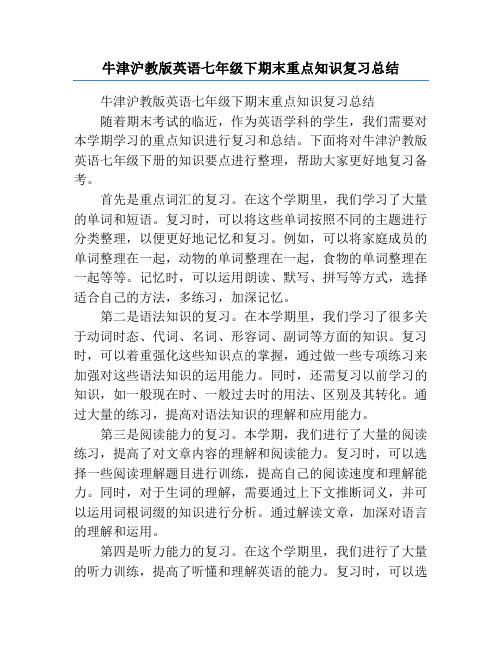
牛津沪教版英语七年级下期末重点知识复习总结牛津沪教版英语七年级下期末重点知识复习总结随着期末考试的临近,作为英语学科的学生,我们需要对本学期学习的重点知识进行复习和总结。
下面将对牛津沪教版英语七年级下册的知识要点进行整理,帮助大家更好地复习备考。
首先是重点词汇的复习。
在这个学期里,我们学习了大量的单词和短语。
复习时,可以将这些单词按照不同的主题进行分类整理,以便更好地记忆和复习。
例如,可以将家庭成员的单词整理在一起,动物的单词整理在一起,食物的单词整理在一起等等。
记忆时,可以运用朗读、默写、拼写等方式,选择适合自己的方法,多练习,加深记忆。
第二是语法知识的复习。
在本学期里,我们学习了很多关于动词时态、代词、名词、形容词、副词等方面的知识。
复习时,可以着重强化这些知识点的掌握,通过做一些专项练习来加强对这些语法知识的运用能力。
同时,还需复习以前学习的知识,如一般现在时、一般过去时的用法、区别及其转化。
通过大量的练习,提高对语法知识的理解和应用能力。
第三是阅读能力的复习。
本学期,我们进行了大量的阅读练习,提高了对文章内容的理解和阅读能力。
复习时,可以选择一些阅读理解题目进行训练,提高自己的阅读速度和理解能力。
同时,对于生词的理解,需要通过上下文推断词义,并可以运用词根词缀的知识进行分析。
通过解读文章,加深对语言的理解和运用。
第四是听力能力的复习。
在这个学期里,我们进行了大量的听力训练,提高了听懂和理解英语的能力。
复习时,可以选择一些较难的听力材料进行听写和理解练习,例如听对话选择答案、听短文填空等。
此外,还可以通过听英语原版的歌曲、电影、电视剧等,提高对真实语境下英语的听力能力。
最后是口语表达的复习。
英语学习的最终目标是能够流利地进行口语的沟通。
复习时,我们可以进行一些角色扮演的练习,模拟真实场景,例如购物、旅游、问路等,同时也可以与同学进行对话,提高自己的口语表达能力。
要注意注意纠正语音、语调和语速,使自己的口语更自然、流利。
牛津上海七年级英语下知识点复习汇总Unit 2 Going to see a film
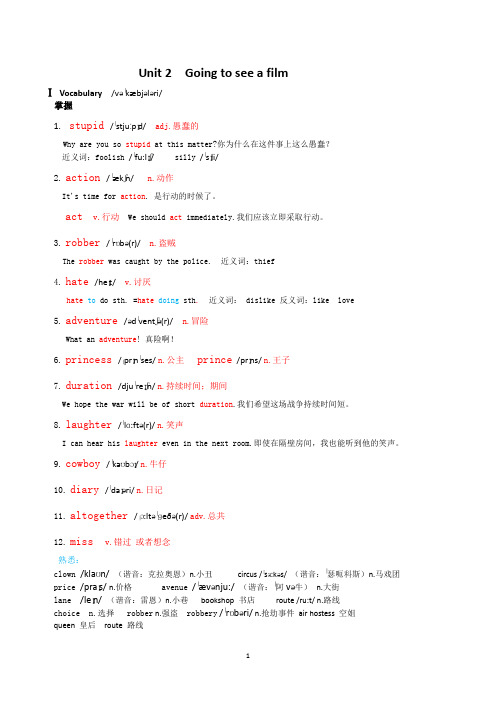
Unit 2 Going to see a filmⅠVocabulary/vəˈkæbjələri/掌握1. stupid /ˈstjuːpɪd/ adj.愚蠢的Why are you so stupid at this matter?你为什么在这件事上这么愚蠢?近义词:foolish /ˈfu:lɪʃ/ silly /ˈsɪli/2.action /ˈækʃn/ n.动作It's time for action. 是行动的时候了。
act v.行动We should act immediately.我们应该立即采取行动。
3.robber /ˈrɒbə(r)/ n.盗贼The robber was caught by the police. 近义词:thief4.hate /heɪt/ v.讨厌hate to do sth. =hate doing sth. 近义词: dislike 反义词:like love5.adventure /ədˈventʃə(r)/ n.冒险What an adventure! 真险啊!6.princess /ˌprɪnˈses/ n.公主prince/prɪns/ n.王子7.duration /djuˈreɪʃn/ n.持续时间;期间We hope the war will be of short duration.我们希望这场战争持续时间短。
ughter /ˈlɑ:ftə(r)/ n.笑声I can hear his laughter even in the next room.即使在隔壁房间,我也能听到他的笑声。
9.cowboy /ˈkaʊbɔɪ/ n.牛仔10.diary /ˈdaɪəri/ n.日记11.altogether /ˌɔ:ltəˈɡeðə(r)/ adv.总共12.miss v.错过或者想念熟悉:clown/klaʊn/ (谐音:克拉奥恩)n.小丑circus /ˈsɜ:kəs/ (谐音:ˈ瑟呃科斯)n.马戏团price /praɪs/ n.价格 avenue /ˈævənju:/ (谐音:ˈ阿və牛)n.大街lane /leɪn/ (谐音:雷恩)n.小巷bookshop 书店route /ru:t/ n.路线choice n.选择 robber n.强盗 robbery/ˈrɒbəri/ n.抢劫事件air hostess 空姐queen 皇后route 路线ⅡPhrase /freɪz/1.take a look=have a look 看一看let's take/have a look around the exhibition./ˌeksɪˈbɪʃn/ n.展览咱们看看展览吧。
(word完整版)牛津沪教版英语七年级下期末重点知识复习总结,推荐文档.docx
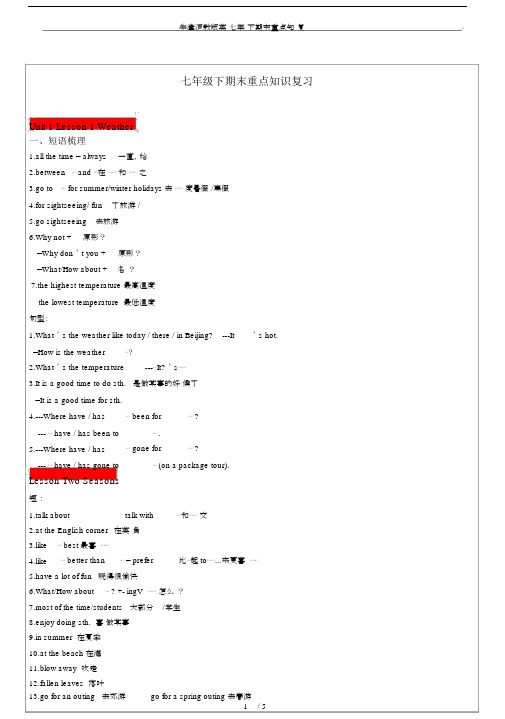
牛津沪教版英七年下期末重点知复七年级下期末重点知识复习Unit 1 Lesson 1 Weather一、短语梳理1.all the time = always一直,始2.between⋯and⋯在⋯⋯ 和⋯⋯ 之3.go to⋯for summer/winter holidays去⋯⋯ 度暑假/寒假4.for sightseeing/ fun了旅游/5.go sightseeing去旅游6.Why not +原形?=Why don ’ t you +原形?=What/How about +名?7.the highest temperature 最高温度the lowest temperature 最低温度句型:1.What ’ s the weather like today / there / in Beijing? ---It’ s hot.=How is the weather⋯?2.What ’ s the temperature---⋯It? ’ s⋯⋯3.It is a good time to do sth. 是做某事的好候了=It is a good time for sth.4.---Where have / has⋯ been for⋯ ?--- ⋯ have / has been to⋯ .5.---Where have / has⋯ gone for⋯ ?--- ⋯ have / has gone to⋯ (on a package tour).Lesson Two Seasons短:1.talk about talk with⋯和⋯⋯交2.at the English corner在英角3.like⋯ best最喜⋯⋯4.like⋯ better than⋯ = prefer比⋯起to⋯⋯...来更喜⋯⋯5.have a lot of fun玩得很愉快6.What/How about⋯ ? +- ingV⋯⋯怎么?7.most of the time/students大部分 /学生8.enjoy doing sth. 喜做某事9.in summer 在夏季10.at the beach 在海11.blow away 吹走12.fallen leaves 落叶14.make snowmen 堆雪人牛津沪教版英七年下期末重点知复法:so 和 neither 引的倒装句1、 So 同,也一So 后面接 be,have, has, do, does, did 或情,然后接主,其的与上文一致,人称与主一致。
牛津英语(上海版)七年级下知识点
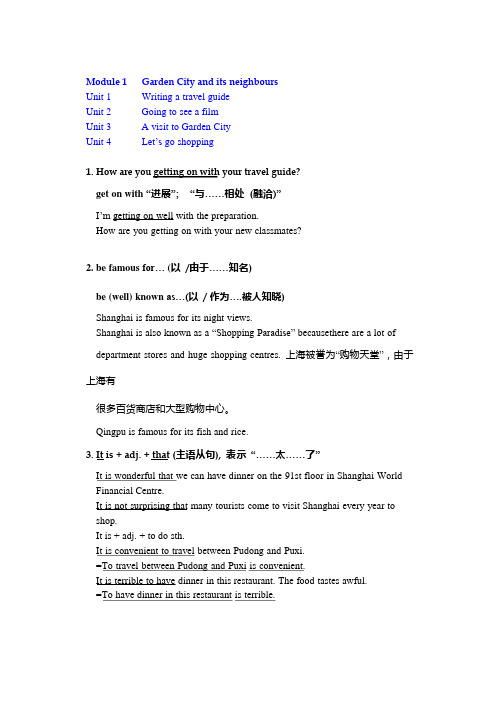
Module 1 Garden City and its neighboursUnit 1 Writing a travel guideUnit 2 Going to see a filmUnit 3 A visit to Garden CityUnit 4 Let’s go shopping1.How are you getting on with your travel guide?get on with “进展”;“与……相处(融洽)”I’m getting on well with the preparation.How are you getting on with your new classmates?2.be famous for… (以/由于……知名)be (well) known as…(以/ 作为….被人知晓)Shanghai is famous for its night views.Shanghai is also known as a “Shopping Paradise” becausethere are a lot of department stores and huge shopping centres. 上海被誉为“购物天堂”,由于上海有很多百货商店和大型购物中心。
Qingpu is famous for its fish and rice.3.It is + adj. + that (主语从句), 表示“……太……了”It is wonderful that we can have dinner on the 91st floor in Shanghai World Financial Centre.It is not surprising that many tourists come to visit Shanghai every year to shop.It is + adj. + to do sth.It is convenient to travel between Pudong and Puxi.=To travel between Pudong and Puxi is convenient.It is terrible to have dinner in this restaurant. The food tastes awful.=To have dinner in this restaurant is terrible.4.If you go there, you will see a huge open area with green grass, trees, fountains and pigeons.主句用一般将来〔或can,may,must〕,从句用一般现在时。
牛津上海版七年级下英语常用语法知识——感叹句知识点

一、选择题1.—Tony, it's time ________ dinner.—I'm coming, dad.A.have B.to have C.had D.having B解析:B【解析】【分析】【详解】句意:——托尼,到了吃晚饭时间了。
——爸爸,我来了。
考查固定句式。
have dinner吃晚餐。
have动词原形;to have不定式;had一般过去时;having现在分词。
根据固定搭配“到了做某事的时候了it’s time to do sth.”,故选B。
2.—You don’t know what great difficulty I had ________ to get the two tickets.—But the film is really worth _________ twice.A.managing; seeing B.to manage; seeingC.managing; being seen D.managed; to see A解析:A【解析】【分析】【详解】试题分析: 句意:---你不知道我试图得到两张票有多大的困难。
---但是电影值得看两遍。
此题考查固定短语have difficulty doing sth 做某事有困难,be worth doing事值得做;根据句意,故选A。
3.Our parents won't allow us _____ in the river alone.A.swimB.to swimC.swimmingD.swam B解析:B【解析】句意:我们的父母不允许我们单独去河里游泳。
A. swim动词原形;B. to swim动词不定式;C. swimming分词形式;D. swam过去式。
Allow sb to do sth允许某人做某事。
故答案选B。
点睛:接动词不定式作宾语补足语的常见动词:advise. 建议;allow 允许;ask 请(叫);encourage.鼓励;expect 期望;help. 帮助;invite. 邀请; like 喜欢;need需要;order命令;prefer. 宁愿teach .教;tell 告诉;want. 想;warn. 警告;wish希望等。
上海牛津英语七年级下知识点

上海牛津英语七年级下知识点在七年级下学期的牛津英语课程中,学生们需要学习并掌握一些重要的语法知识和单词,以便能够更准确地表达自己的想法和理解他人的意思。
下面将逐一介绍这些知识点。
一、时态在英语中,时态是表达时间的重要方法。
七年级下册需要学习的时态包括:一般现在时、一般过去时、一般将来时和现在进行时。
掌握这些时态的用法可以使学生更好地描述过去、现在和未来的事情。
二、句型在七年级下学期还需要学习不同的句型,包括简单句、并列句和复合句等等。
学生需要掌握这些句型中不同组成部分的用法和特征,以便更好地书写自己的文章。
三、单词单词是语言中的基本单位之一,也是英语教学中必不可少的一部分。
在七年级下学期的牛津英语课程中,学生们需要掌握一些新的单词,比如:vacation、temperature、homework等等。
学生需要通过不断的练习来掌握这些新单词的拼写和意思。
四、语法在七年级下学期,学生们还需要学习英语语法中的基本概念和规则,比如主语和谓语的关系、名词性从句、形容词和副词比较级等等。
这些知识点可以帮助学生更好地理解英语句子的构成和文法规则。
五、听力听力是语言学习中一个非常重要的方面。
在七年级下学期的牛津英语课程中,学生需要通过听力训练来学习、理解和使用不同的语音和口音、短语和单词。
这有助于学生更好地了解英语的真实用法和语音语调。
六、阅读阅读是英语学习的重要组成部分。
在七年级下学期的牛津英语课程中,学生们需要通过各种材料来进行阅读,比如文章、故事、新闻、标语等等。
通过阅读,学生们可以更好地了解不同的语言和文化。
七、口语在英语学习中,口语是非常重要的方面。
在七年级下学期的牛津英语课程中,学生们需要通过口语练习来加强自己的口语表达能力。
通过不断地听、说、读、写,学生们可以提高英语水平。
总之,在七年级下学期的牛津英语课程中,学生们需要学习并掌握这些重要的知识点,以便更好地表达自己的想法和理解他人的意思。
只有通过不断的练习和巩固,才能真正掌握好英语语言。
- 1、下载文档前请自行甄别文档内容的完整性,平台不提供额外的编辑、内容补充、找答案等附加服务。
- 2、"仅部分预览"的文档,不可在线预览部分如存在完整性等问题,可反馈申请退款(可完整预览的文档不适用该条件!)。
- 3、如文档侵犯您的权益,请联系客服反馈,我们会尽快为您处理(人工客服工作时间:9:00-18:30)。
Module 1 Garden City and its neighboursUnit 1 Writing a travel guideUnit 2 Going to see a filmUnit 3 A visit to Garden CityUnit 4 Let’s go shopping1. How are you getting on with your travel guide?get on with “进展”; “与……相处(融洽)”I’m getting on well with the preparation.How are you getting on with your new classmates?2. be famous for… (以/由于……出名)be (well) known as…(以/ 作为….被人知晓)Shanghai is famous for its night views.Shanghai is also known as a “Shopping Paradise” becausethere are a lot ofdepartment stores and huge shopping centres.上海被誉为“购物天堂”,因为上海有很多百货商店和大型购物中心。
Qingpu is famous for its fish and rice.3. It is + adj. + that (主语从句), 表示“……太……了”It is wonderful that we can have dinner on the 91st floor in Shanghai World Financial Centre.It is not surprising that many tourists come to visit Shanghai every year toshop.It is + adj. + to do sth.It is convenient to travel between Pudong and Puxi.=To travel between Pudong and Puxi is convenient.It is terrible to have dinner in this restaurant. The food tastes awful.=To have dinner in this restaurant is terrible.4. If you go there, you will see a huge open area with green grass, trees, fountains and pigeons. 主句用一般将来(或can, may, must),从句用一般现在时。
Firemen will have no water to put out fires if there is no rain.We’ll go on an outing if it doesn’t rain tomorrow.If you go there, you can find a famous church.5. The Maglev takes you to the international airport in about eight minutes.磁悬浮列车可以在八分钟之内将你带到国际机场。
take sb. to …“带某人去某地”in + 时间段, 表示1.“在......之内”;2. “在……之后”My father used to take me to the park nearly every weekend.It takes you about eight minutes to travel to the international airport by Maglev.The artist could draw a horse in five minutes.I would like to be an English teacher in 10 years’ time.My father will be back from Australia in a week.Travelling in ShanghaiShanghai is in the east of China. It is an international city. It is famous for its night views, local snacks. It is also known as a “Shopping Paradise”because there are a lot of department stores and shopping centres.If you go to Shanghai, you will see People’s Square. It is in the centre of Shanghai. If you go to Pudong, you can see the Oriental Pearl TV Tower and Shanghai Science and Technology Museum. The Maglev takes youto the international airport in about eight minutes. At Sheshan you will find a famous church and an observatory. In Yu Garden, you can eat different kinds of local snacks.There are many interesting places in Shanghai. Therefore, it is not surprising that tourists come to visit Shanghai every year!6. take (have) a look at... = look at…Let’s take (have) a look at the film guide.Would you like to have a look at the photo?7. hate to do sth. = hate doing sth. 不喜欢,讨厌I hate action films.(I hate seeing action films./ I hate to see action films.)8. It’s an action film and it’s very exciting.action film (武打片,动作片); love story (爱情片);cartoon (卡通片); exciting film(惊险片);cowboy story (西部片); horror story (恐怖片);police story(警匪片); documentary(纪录片)9. be full of …“充满,挤满”(状态)be filled with …“灌满,装满”(动作)The bottle is full of milk. (The bottle is filled with milk.)At lunch time, the school dining room is always full of people. Our English teacher is a man full of energy.The street is full of people.(句意不变)→ The street is crowded with people.10.--How long is the film? 电影片长多久?-- It’s 120 minutes.→How long does the film last? It lasts 80 minutes.The duration of “Swan Lake” is 80 minutes.11.How much are they going to pay for the tickets altogether?Sb. pays… for sth.I paid 90 yuan for the coat last Saturday.→ How much did you pay for the coat last Saturday?Sth. costs sb. …The coat cost me 90 yuan last Saturday.The experiment cost him two years of hard work.Sb. spends … on sth.Every morning Peter spends half an hour on /(in) reading English.I spent one and a half hours doing my homework last night.It takes sb. … to do sth.It took us 30 minutes to get to the Grand View Garden by car.It takes me five minutes to walk to school in the morning.You can take a bus there. (You can go there by bus.)We took a cable car up to the top of the mountain.Welcome to SheshanSuggested questions:1. Where is Sheshan in Shanghai?2. Which places can you visit in Sheshan?3. How can you go there and what do you think of Sheshan?Sheshan is in the southwest of Shanghai. It’s about 30 kilometres away from the centre of the city.There are many interesting places in Sheshan. You can visit the Forest Parkand there is a famous church at the top of the mountain.If you go there, you can also find anobservatory.It’s a beautiful resort. You can go there by bus. I think you will enjoy yourself there.12. for prep.达(时间段)之久;since prep. & conj. 自从(过去时间点)以来My uncle has been in the Army for 3 years.= (My uncle joined the Army 3 years ago.)Peter has worked in this company since 2005.= (Peter started to work in this company in 2005.)= (Peter has worked in this company for 4 years.)I have had the digital camera for 2 years.= I bought the digital camera 2 years ago.My grandfather has lived in the old town since he was born.I haven’t seen you for a long time.His father has been in Shanghai for quite a few years.13. Aunt Betty works in a company in Beijing, doesn’t she?She often has lunch at school, doesn’t she?It’s very cold today, isn’t it?Your father is unhappy, isn’t he?It is impossible to learn English well without remembering more words, isn’t it?My sister never tells a lie, does she?She can hardly speak Chinese, can she?He was seldom late for school, was he?I am an English teacher, aren’t I?(注:回答此类问题时,应按实际情况当一般疑问句作答,用Yes或No;但回答“前否后肯”的句子时,它的中英文意思则不同。
